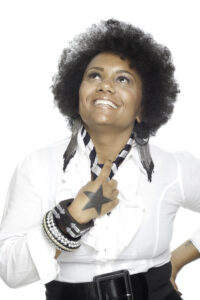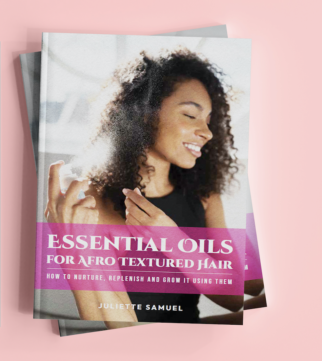 Ask any naturalista – especially a newbie – about their main concern for maintaining healthy looking and healthy feeling hair. Moisture retention will definitely be near the top. Achieving results are easier than you think but first, let’s sort through all the stuff you may have been told or read, by busting a few myths.
Ask any naturalista – especially a newbie – about their main concern for maintaining healthy looking and healthy feeling hair. Moisture retention will definitely be near the top. Achieving results are easier than you think but first, let’s sort through all the stuff you may have been told or read, by busting a few myths.
Since we curly and coily heads, don’t produce enough sebum (oil) from scalps for moisture from root to end like those with straighter textures, we must be gentler and pay more attention. The sebum needs to travel along all those curves in the coily and curl hair strands – much more difficult than along a straighter strand. This is the reason that Black hair tends to be more dry.
Moisture Myth #1 – Our type of hair doesn’t like water.
It’s just the opposite – the daily use of water a.k.a moisture, is absolutely necessary for hair health and beauty. Moisturizing hair means adding water daily rather than shampooing and conditioning everyday. Moisturized hair is less likely to break, is softer and easier to manage and will retain length.
Moisture Myth #2 – Hydrating and moisturizing are the same.
Hydration means maintaining the fluid balance in our bodies, including our hair. Hydrating products are designed to add water and reduce moisture loss whereas moisturizing hair products like creams and emollients (butters and oils), are for preventing water from evaporating or locking water or moisture into the hair. So oils and grease do not equal moisture! There are powerful oils like coconut and jojoba which can penetrate hair strands but oils and butters mainly act as sealants after you’ve added moisture.
Don’t forget to pay attention to the ends, where it’s most fragile and dry. After sealing with butter and/or oil, twirl, twist them or tuck away in individual Bantu knots.
Moisture Myth #3 – What you use on your hair is the most important thing.
While reading those labels carefully for what we apply on hair is critical, what we put in our bodies is even more important. It must be stressed that we must maintain hydration or drink plenty of water to maintain health. Drinking lots of water and having a healthy diet means hair is moisturized from the inside out, making it nourished, stronger and less prone to breakage.
Taking vitamins and minerals help too. Be on the look out for those with hair strengthening and growth properties like amino acids, biotin, zinc, MSM (organic sulfur), copper, inositol and choline.
Moisture Myth #4 – When Black people shampoo their hair, it will get dry.
This is certainly true especially if the shampoo is not paraben and sulfate-free, but our hair and scalp needs to be cleansed weekly to get rid of dirt, product build-up and pollutants and unclog pores, to be healthy. Cleansing the scalp and hair means the moisturizing and styling products you use will be more effective.
While hair is stripped of protein and natural oils during shampooing, be sure to prepare your hair by pre-pooing first with oil. Versatile coconut oil is a favorite for pre-pooing hair since it reduces protein loss during washing.
Following up shampoo with deep conditioning or a deep conditioning hair masque, is critical so moisture can get under the hair cuticles to reach the hair shaft. The use of indirect heat (a warm towel tossed in the dryer for a few minutes over a plastic cap or bag) will allow better penetration of the conditioner.
Consider co-washing. Co-washing (conditioning washing or conditioner-only wash) your hair during the week also supports hydration and detangling, moisturizes your scalp and maintains your curl pattern. While co-washing is effective, you still will want to use shampoo regularly to remove build-up from products – whether completely natural or prepared.
Moisture Myth #5 – As long as the ingredients are fine, all natural hair products work the same.
You are unique and so is your hair. Keep in mind African American hair strand textures and types differ, so what works for your sista, may not work for you. Your personal health and the condition of your hair are also key factors.
Does your hair feel dry? It probably needs properly moisturizing. Does it feel limp? Maybe it’s over-moisturized or you’re using something not suitable or too heavy for its texture. Do your research and try different products to see what is effective, while paying attention to the ingredients and their percentages in prepared products.
Moisturizing your hair with lotion just once when you get ready in the morning may not be enough. Gently mist your hair with water or favorite moisturizing mist at night. Don’t forget to protect your hair with a silk or satin covering!
Moisture Myth #6 – As long as I L.O.C, my hair should be fine.
The L. (water) moisturizes, O. grabs the water molecules and C. locks in moisture. L.O.C (Liquid-Oil-Cream) moisturizing is wonderfully effective but the products used in this natural hair care method must also work for your curl texture. Depending on your hair needs and type, reversing the last 2 steps (L.C.O) may be more effective.
Moisture Myth #7 – My styling products have moisturizers, so that’s enough, right?
Styling products aren’t moisturizing products. While there are great curling custards, foaming lotions and gels on the market that do have moisturizing and other properties, they are primarily designed to give your curls definition and hold. They won’t replace the moisture (water) your hair needs.
Moisturizing Hair Mist Recipes
These mists last for 4-5 days in the fridge. Combine all of your ingredients in a spray bottle, then shake and spray.
Moisturizing Honey Hair Mist Recipe
Get ¼ cup distilled water, 1 tablespoon raw honey, 2 tablespoons coconut oil, 2 tablespoons vitamin E oil and 2-3 drops of lavender essential oil.
Moisturizing Aloe Vera Hair Mist Recipe
Get ¼ cup distilled water, 1 tablespoon aloe vera juice, 1 tablespoon oil (coconut, olive or almond), 1 tablespoon vitamin E oil and 2-3 drops of lavender essential oil
Remember moisture equals healthier and more beautiful hair.
As always …
Dedicated To Your Beauty,
Juliette Samuel
Esthetician/Author/Publisher
Nyraju Skin Care




 Facebook
Facebook Twitter
Twitter Delicious
Delicious Digg
Digg Myspace
Myspace StumbleUpon
StumbleUpon Youtube
Youtube